Demand and Supply Assignment (PDF)
VerifiedAdded on 2021/05/19
|21
|1157
|473
AI Summary
Contribute Materials
Your contribution can guide someone’s learning journey. Share your
documents today.
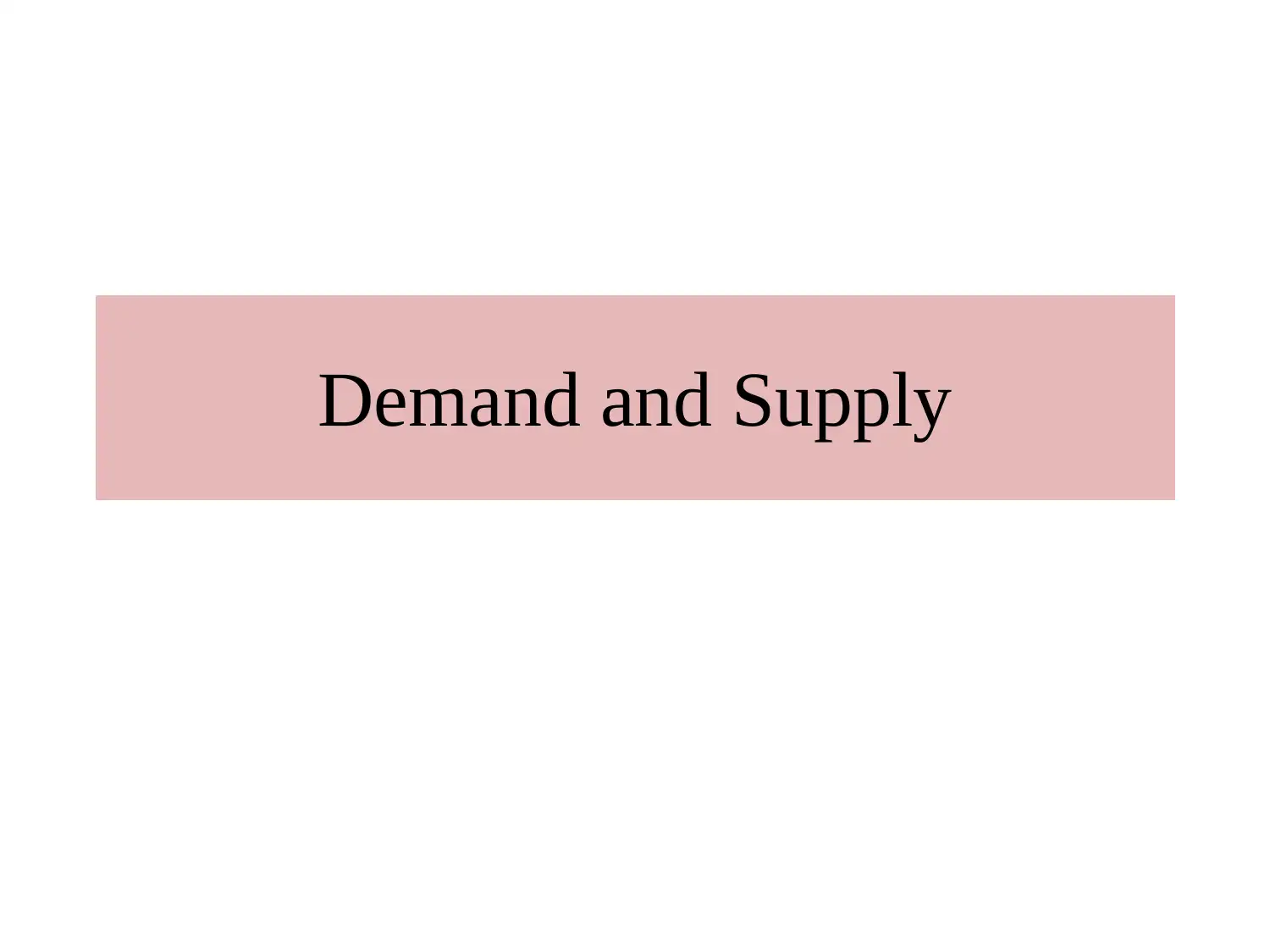
Demand and Supply
Secure Best Marks with AI Grader
Need help grading? Try our AI Grader for instant feedback on your assignments.
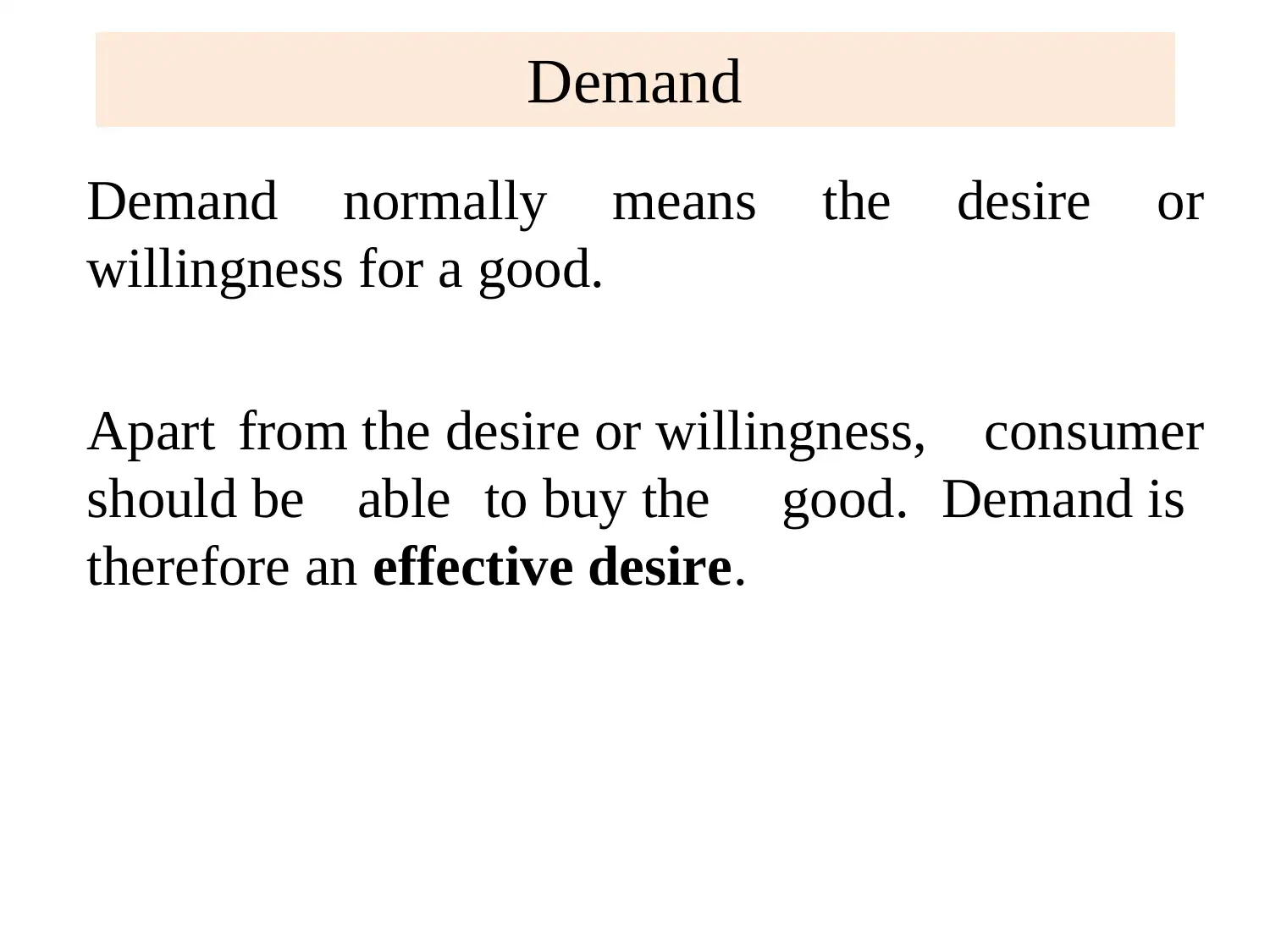
Demand
Demand normally means the desire or
willingness for a good.
Apart from the desire or willingness, consumer
should be able to buy the good. Demand is
therefore an effective desire.
Demand normally means the desire or
willingness for a good.
Apart from the desire or willingness, consumer
should be able to buy the good. Demand is
therefore an effective desire.
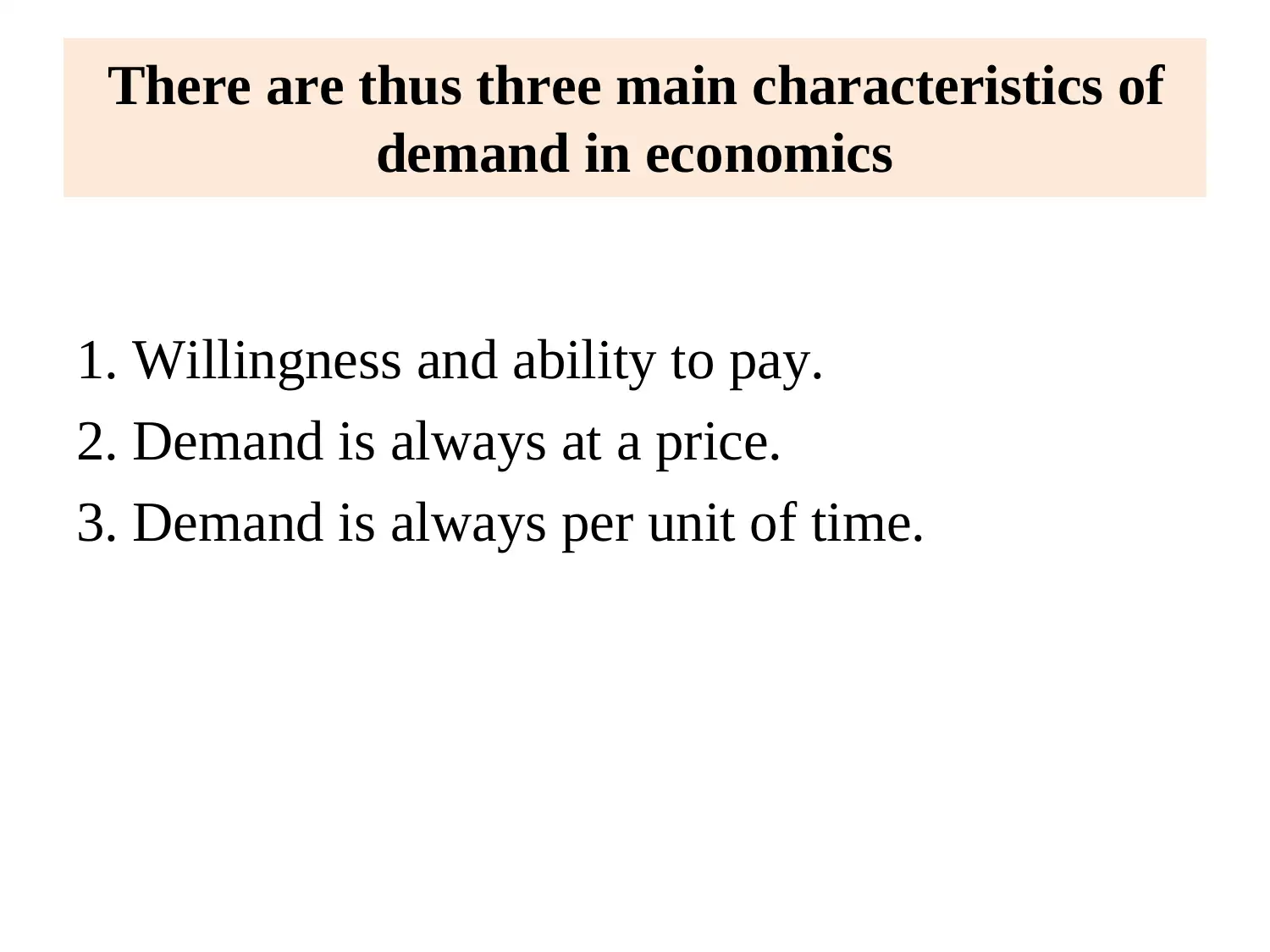
There are thus three main characteristics of
demand in economics
1. Willingness and ability to pay.
2. Demand is always at a price.
3. Demand is always per unit of time.
demand in economics
1. Willingness and ability to pay.
2. Demand is always at a price.
3. Demand is always per unit of time.
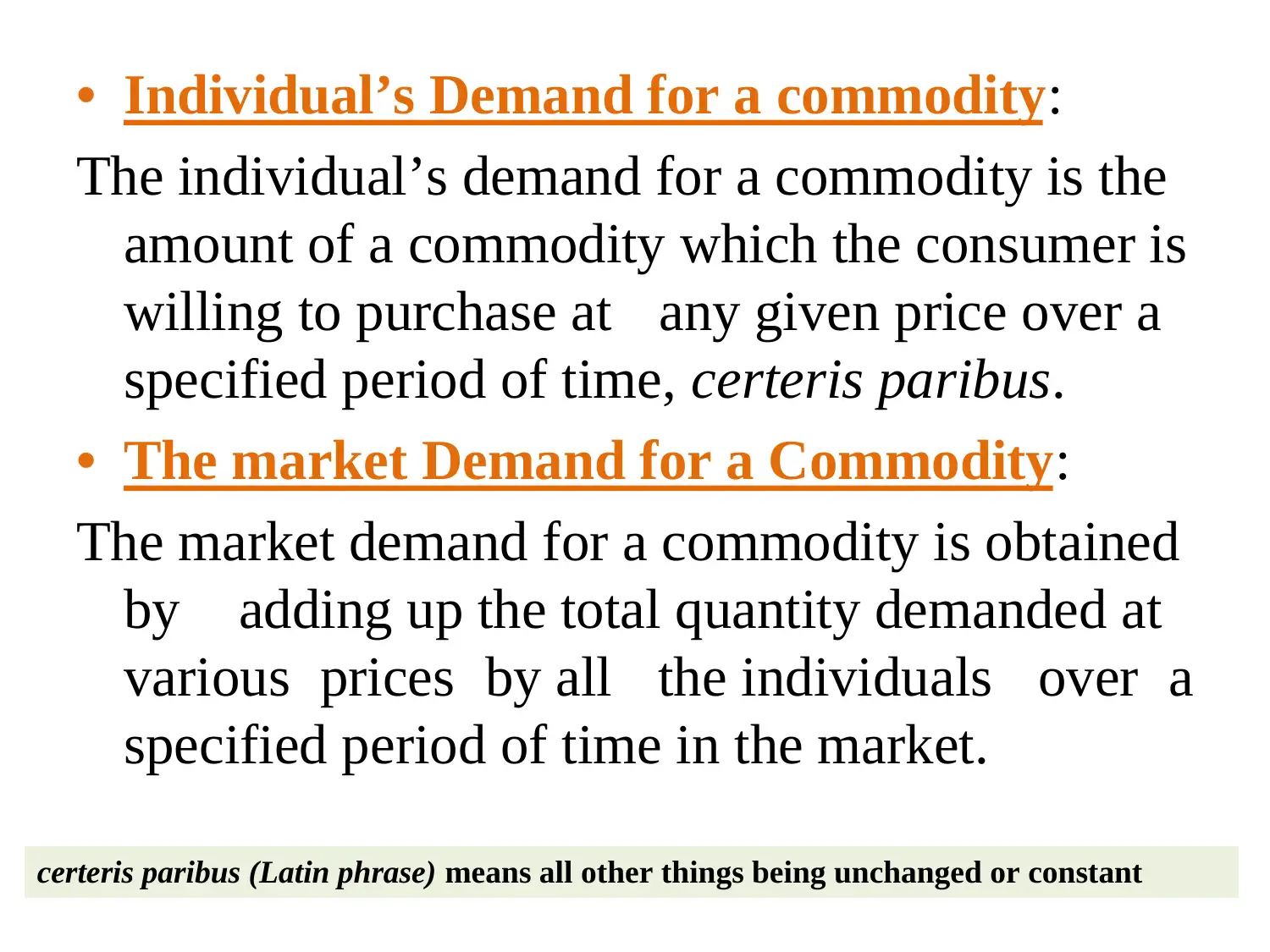
• Individual’s Demand for a commodity:
The individual’s demand for a commodity is the
amount of a commodity which the consumer is
willing to purchase at any given price over a
specified period of time, certeris paribus.
• The market Demand for a Commodity:
The market demand for a commodity is obtained
by adding up the total quantity demanded at
various prices by all the individuals over a
specified period of time in the market.
certeris paribus (Latin phrase) means all other things being unchanged or constant
The individual’s demand for a commodity is the
amount of a commodity which the consumer is
willing to purchase at any given price over a
specified period of time, certeris paribus.
• The market Demand for a Commodity:
The market demand for a commodity is obtained
by adding up the total quantity demanded at
various prices by all the individuals over a
specified period of time in the market.
certeris paribus (Latin phrase) means all other things being unchanged or constant
Secure Best Marks with AI Grader
Need help grading? Try our AI Grader for instant feedback on your assignments.
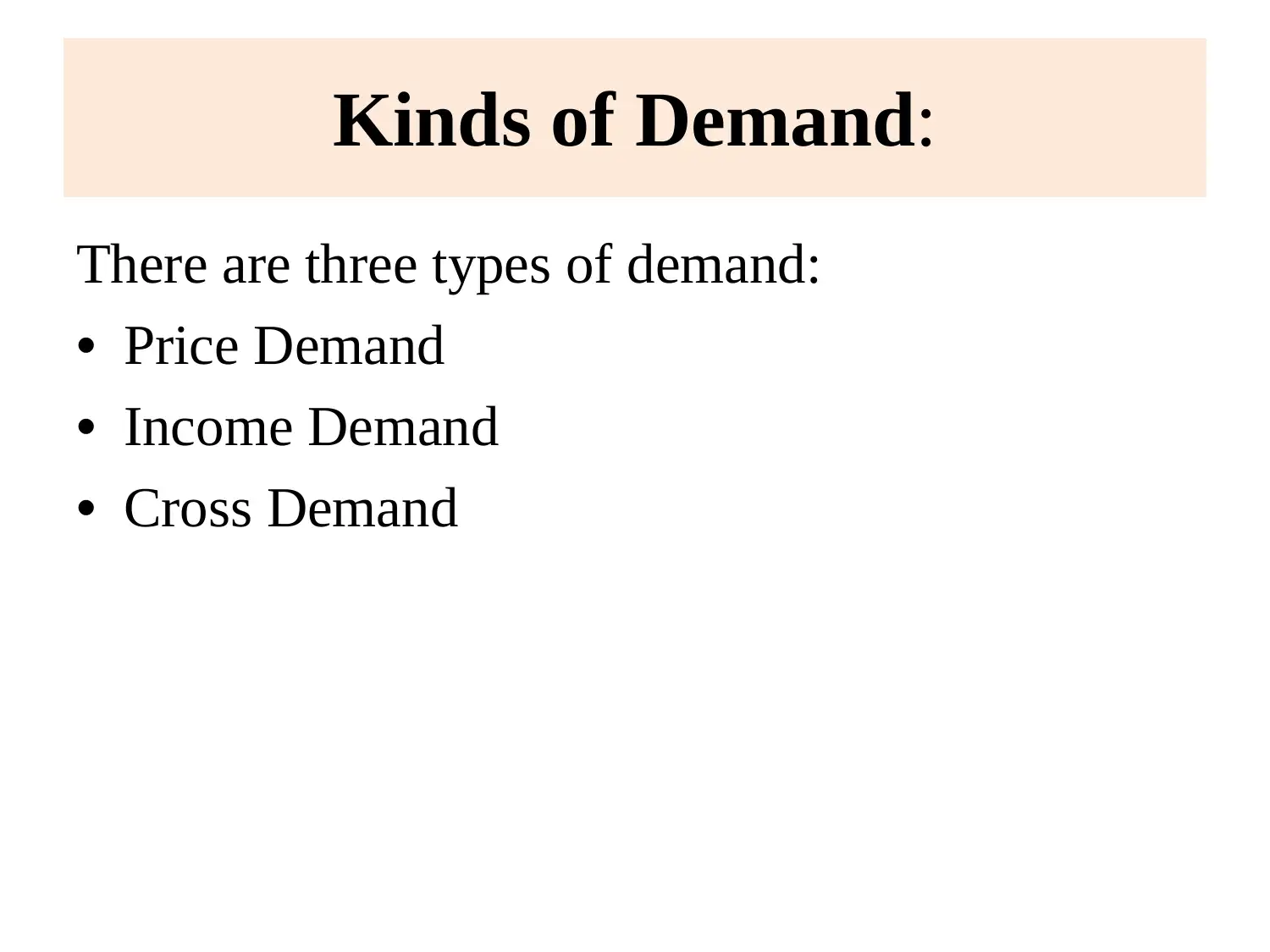
Kinds of Demand:
There are three types of demand:
• Price Demand
• Income Demand
• Cross Demand
There are three types of demand:
• Price Demand
• Income Demand
• Cross Demand
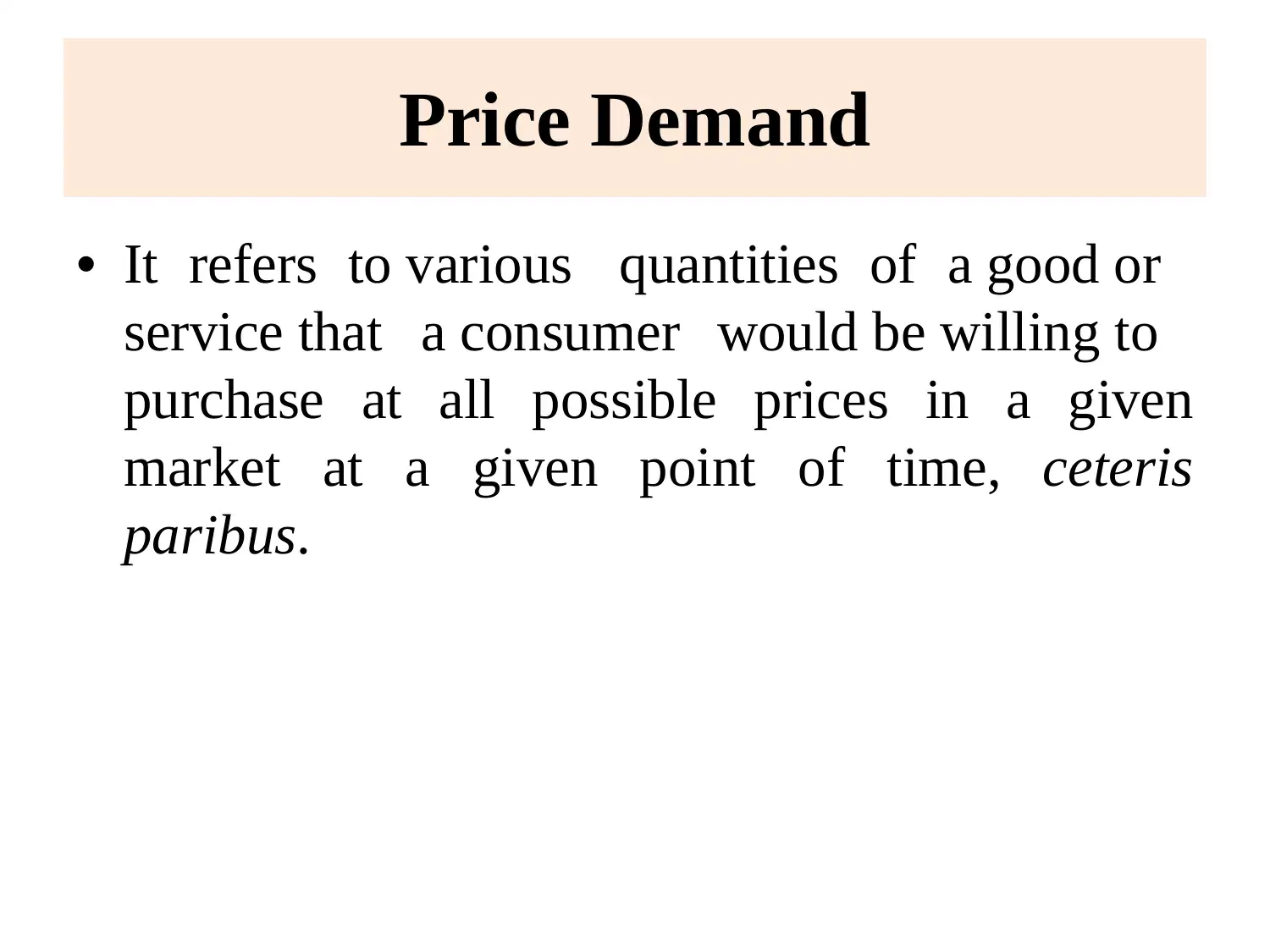
Price Demand
• It refers to various quantities of a good or
service that a consumer would be willing to
purchase at all possible prices in a given
market at a given point of time, ceteris
paribus.
• It refers to various quantities of a good or
service that a consumer would be willing to
purchase at all possible prices in a given
market at a given point of time, ceteris
paribus.
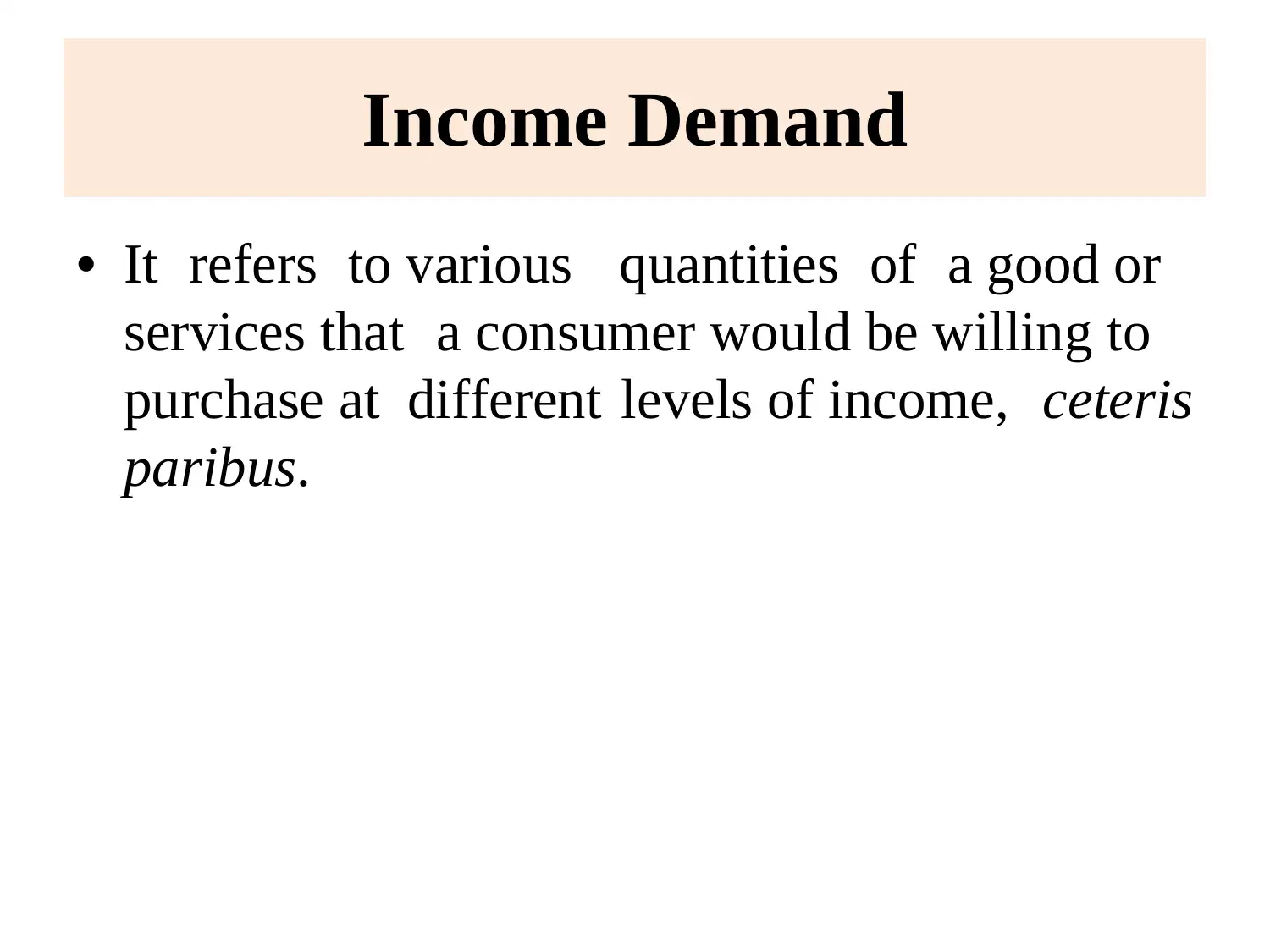
Income Demand
• It refers to various quantities of a good or
services that a consumer would be willing to
purchase at different levels of income, ceteris
paribus.
• It refers to various quantities of a good or
services that a consumer would be willing to
purchase at different levels of income, ceteris
paribus.
Paraphrase This Document
Need a fresh take? Get an instant paraphrase of this document with our AI Paraphraser
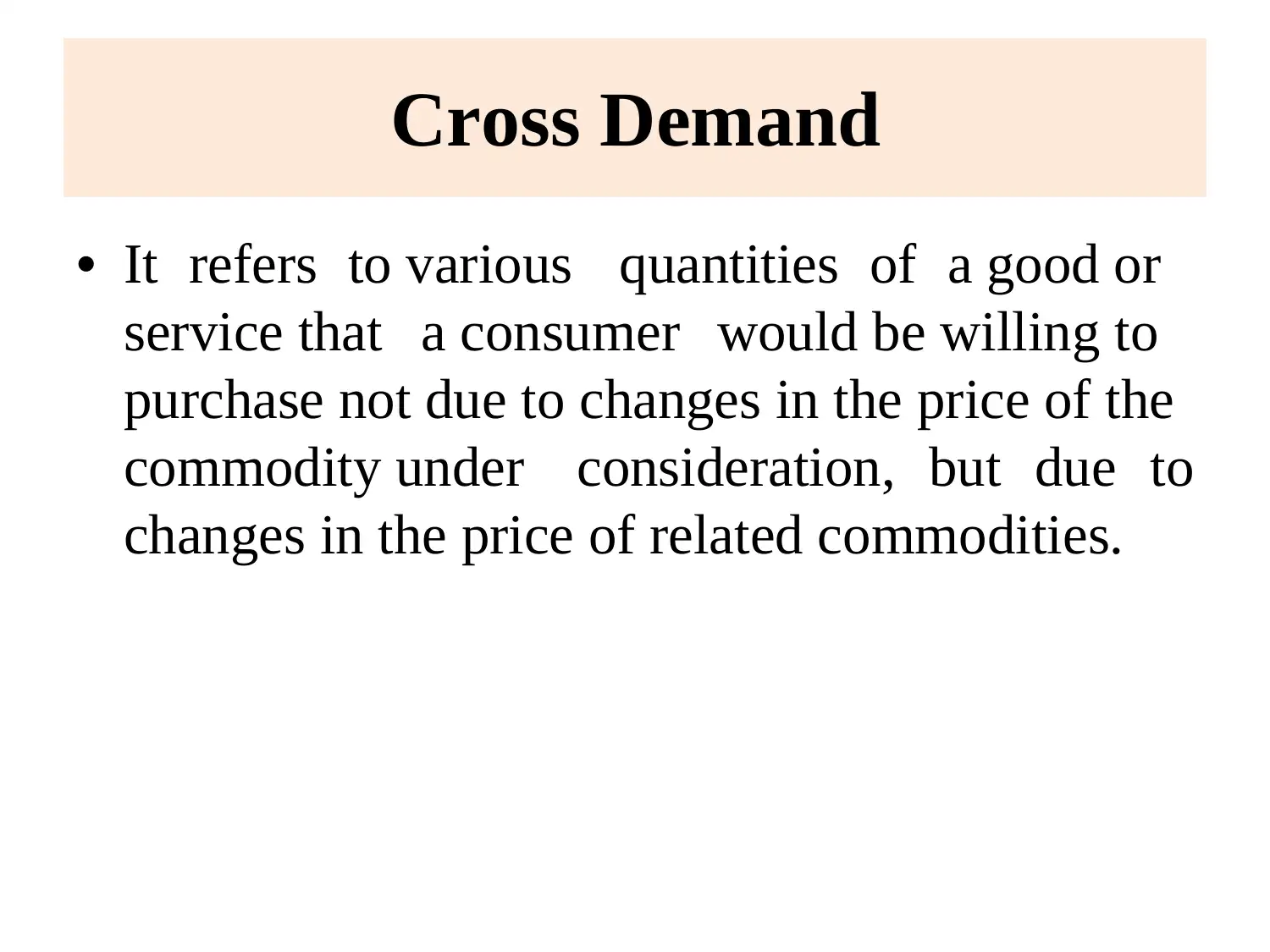
Cross Demand
• It refers to various quantities of a good or
service that a consumer would be willing to
purchase not due to changes in the price of the
commodity under consideration, but due to
changes in the price of related commodities.
• It refers to various quantities of a good or
service that a consumer would be willing to
purchase not due to changes in the price of the
commodity under consideration, but due to
changes in the price of related commodities.
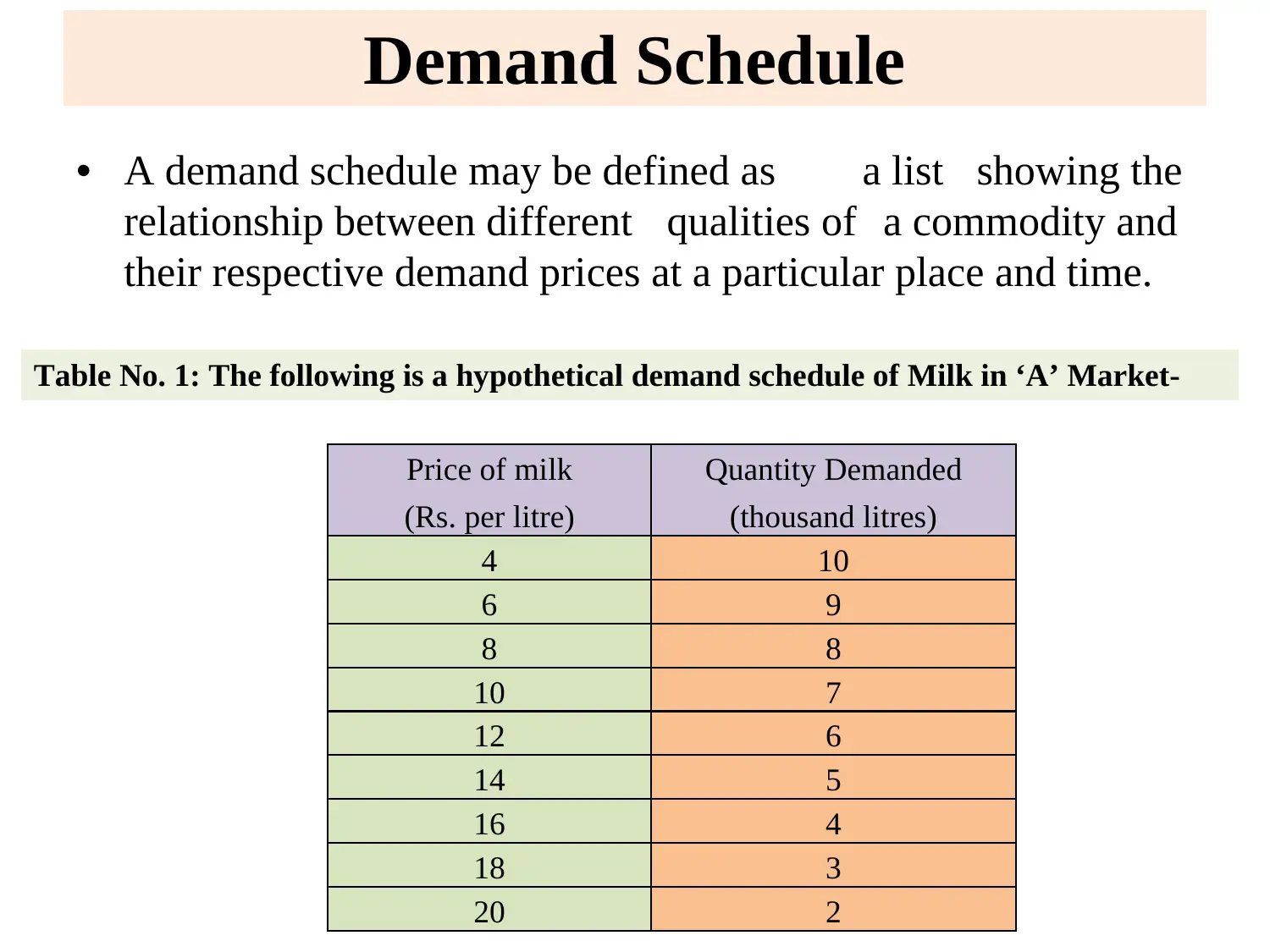
Demand Schedule
• A demand schedule may be defined as a list showing the
relationship between different qualities of a commodity and
their respective demand prices at a particular place and time.
Table No. 1: The following is a hypothetical demand schedule of Milk in ‘A’ Market-
Price of milk
(Rs. per litre)
Quantity Demanded
(thousand litres)
4 10
6 9
8 8
10 7
12 6
14 5
16 4
18 3
20 2
• A demand schedule may be defined as a list showing the
relationship between different qualities of a commodity and
their respective demand prices at a particular place and time.
Table No. 1: The following is a hypothetical demand schedule of Milk in ‘A’ Market-
Price of milk
(Rs. per litre)
Quantity Demanded
(thousand litres)
4 10
6 9
8 8
10 7
12 6
14 5
16 4
18 3
20 2
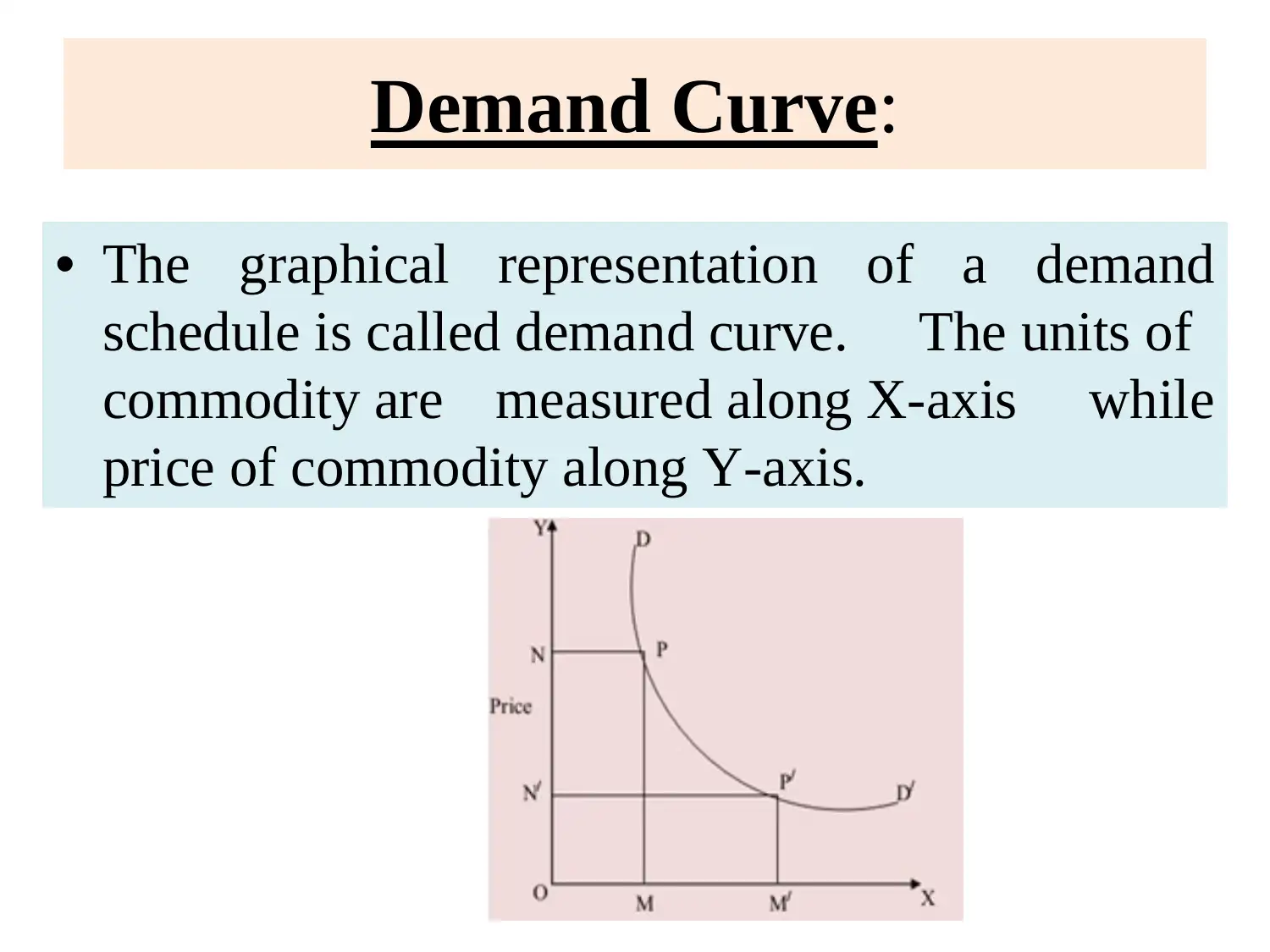
Demand Curve:
• The graphical representation of a demand
schedule is called demand curve. The units of
commodity are measured along X-axis while
price of commodity along Y-axis.
• The graphical representation of a demand
schedule is called demand curve. The units of
commodity are measured along X-axis while
price of commodity along Y-axis.
Secure Best Marks with AI Grader
Need help grading? Try our AI Grader for instant feedback on your assignments.
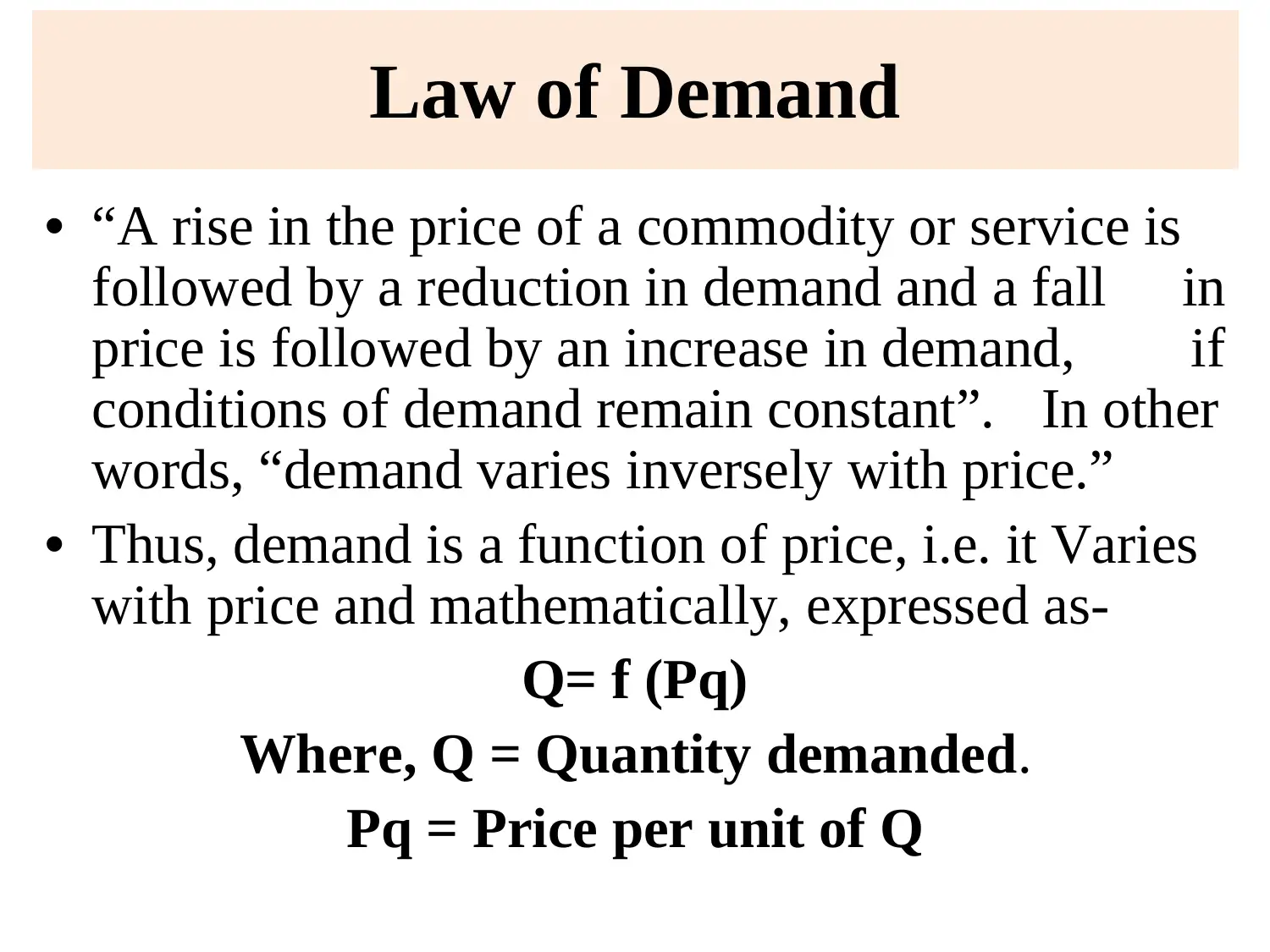
Law of Demand
• “A rise in the price of a commodity or service is
followed by a reduction in demand and a fall in
price is followed by an increase in demand, if
conditions of demand remain constant”. In other
words, “demand varies inversely with price.”
• Thus, demand is a function of price, i.e. it Varies
with price and mathematically, expressed as-
Q= f (Pq)
Where, Q = Quantity demanded.
Pq = Price per unit of Q
• “A rise in the price of a commodity or service is
followed by a reduction in demand and a fall in
price is followed by an increase in demand, if
conditions of demand remain constant”. In other
words, “demand varies inversely with price.”
• Thus, demand is a function of price, i.e. it Varies
with price and mathematically, expressed as-
Q= f (Pq)
Where, Q = Quantity demanded.
Pq = Price per unit of Q
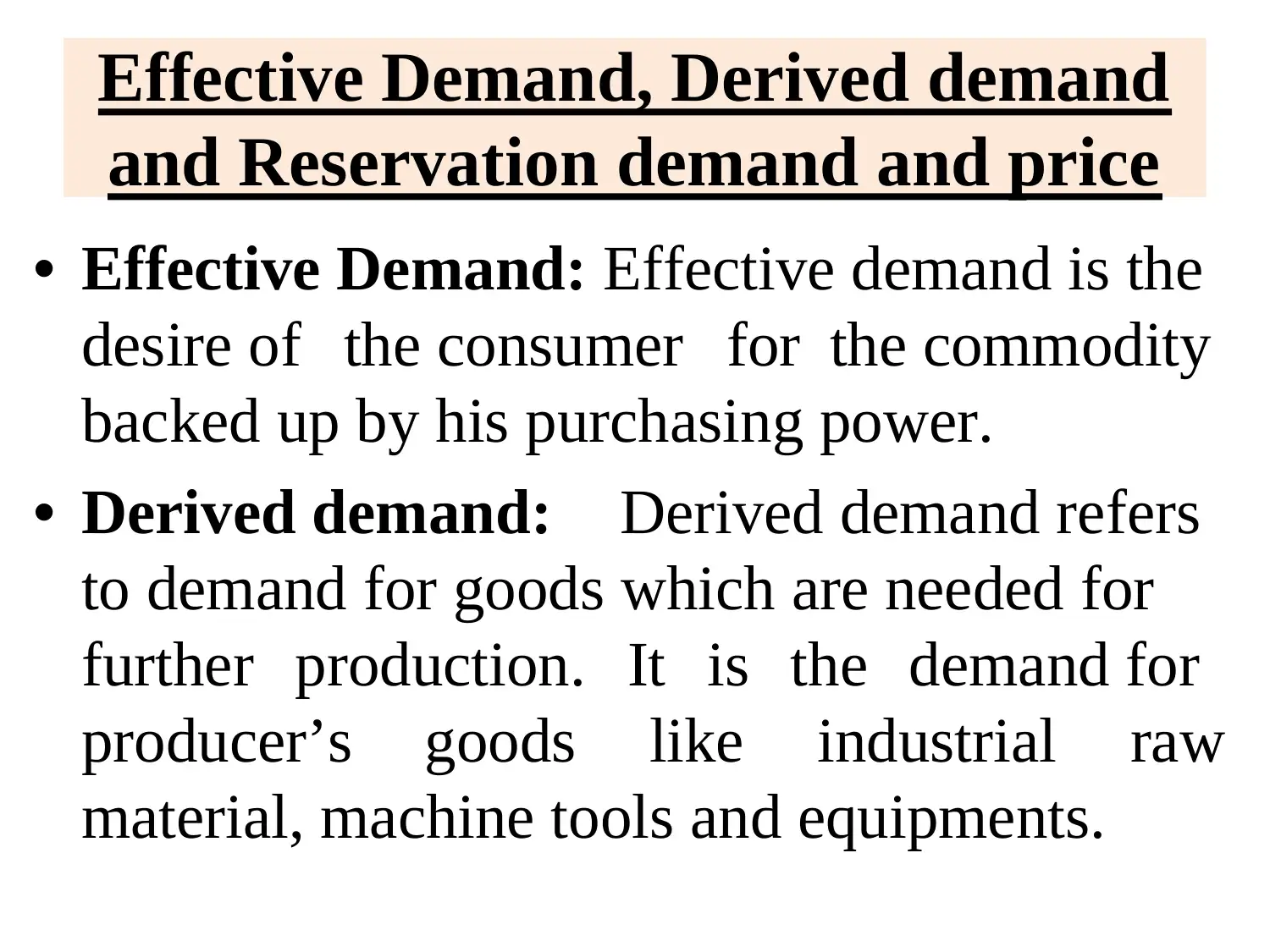
Effective Demand, Derived demand
and Reservation demand and price
• Effective Demand: Effective demand is the
desire of the consumer for the commodity
backed up by his purchasing power.
• Derived demand: Derived demand refers
to demand for goods which are needed for
further production. It is the demand for
producer’s goods like industrial raw
material, machine tools and equipments.
and Reservation demand and price
• Effective Demand: Effective demand is the
desire of the consumer for the commodity
backed up by his purchasing power.
• Derived demand: Derived demand refers
to demand for goods which are needed for
further production. It is the demand for
producer’s goods like industrial raw
material, machine tools and equipments.
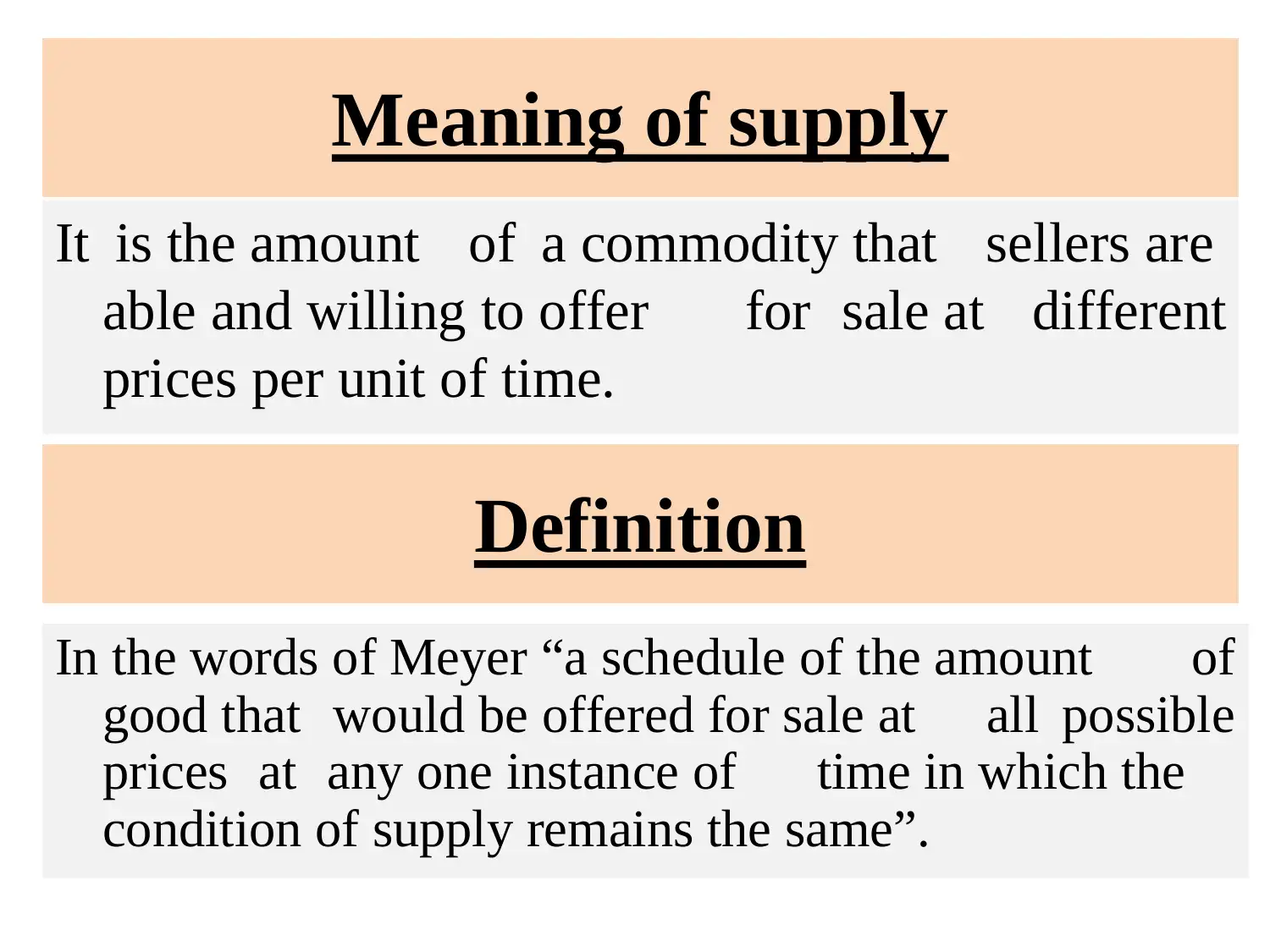
Meaning of supply
It is the amount of a commodity that sellers are
able and willing to offer for sale at different
prices per unit of time.
Definition
In the words of Meyer “a schedule of the amount of
good that would be offered for sale at all possible
prices at any one instance of time in which the
condition of supply remains the same”.
It is the amount of a commodity that sellers are
able and willing to offer for sale at different
prices per unit of time.
Definition
In the words of Meyer “a schedule of the amount of
good that would be offered for sale at all possible
prices at any one instance of time in which the
condition of supply remains the same”.
Paraphrase This Document
Need a fresh take? Get an instant paraphrase of this document with our AI Paraphraser
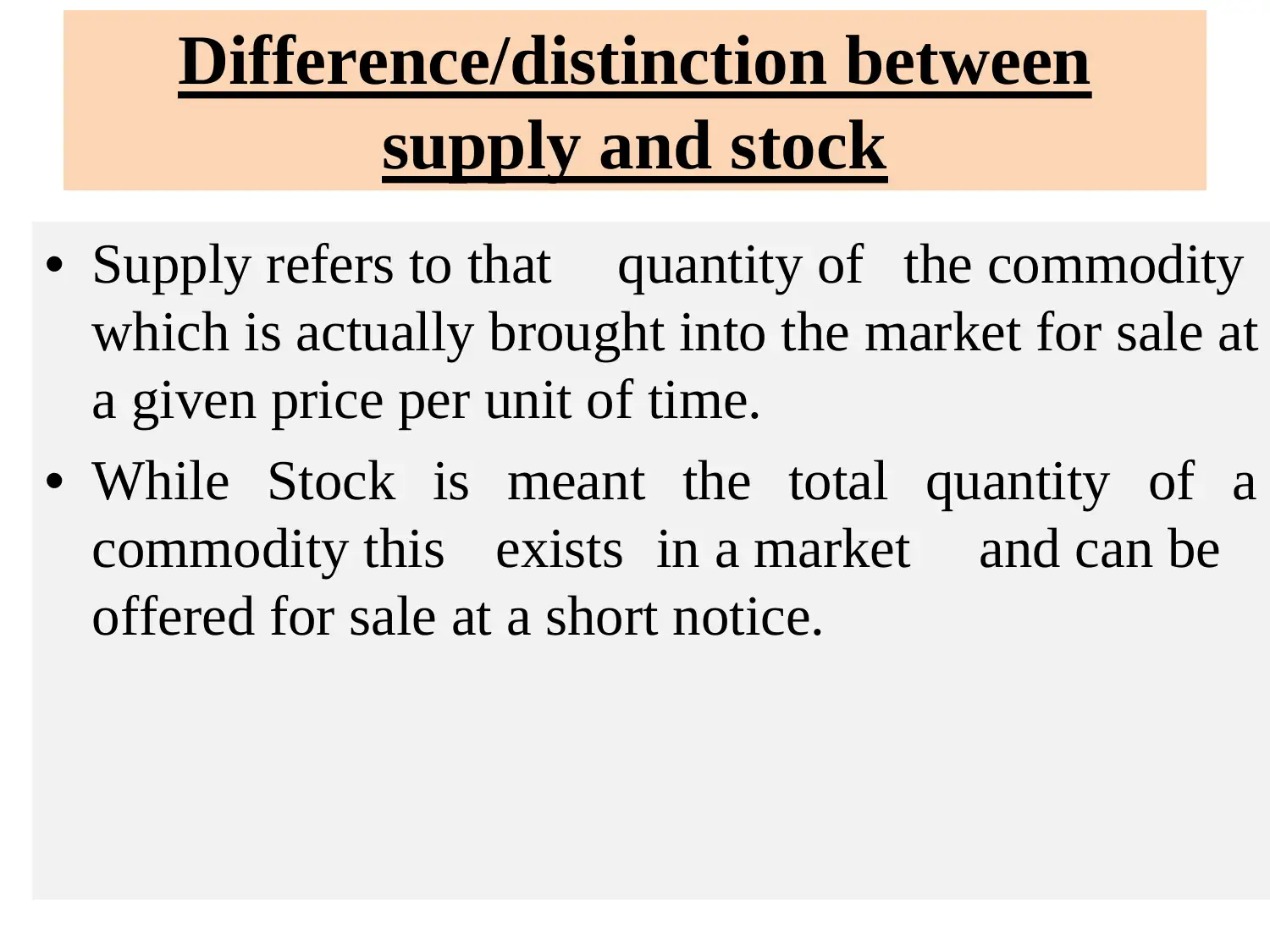
Difference/distinction between
supply and stock
• Supply refers to that quantity of the commodity
which is actually brought into the market for sale at
a given price per unit of time.
• While Stock is meant the total quantity of a
commodity this exists in a market and can be
offered for sale at a short notice.
supply and stock
• Supply refers to that quantity of the commodity
which is actually brought into the market for sale at
a given price per unit of time.
• While Stock is meant the total quantity of a
commodity this exists in a market and can be
offered for sale at a short notice.
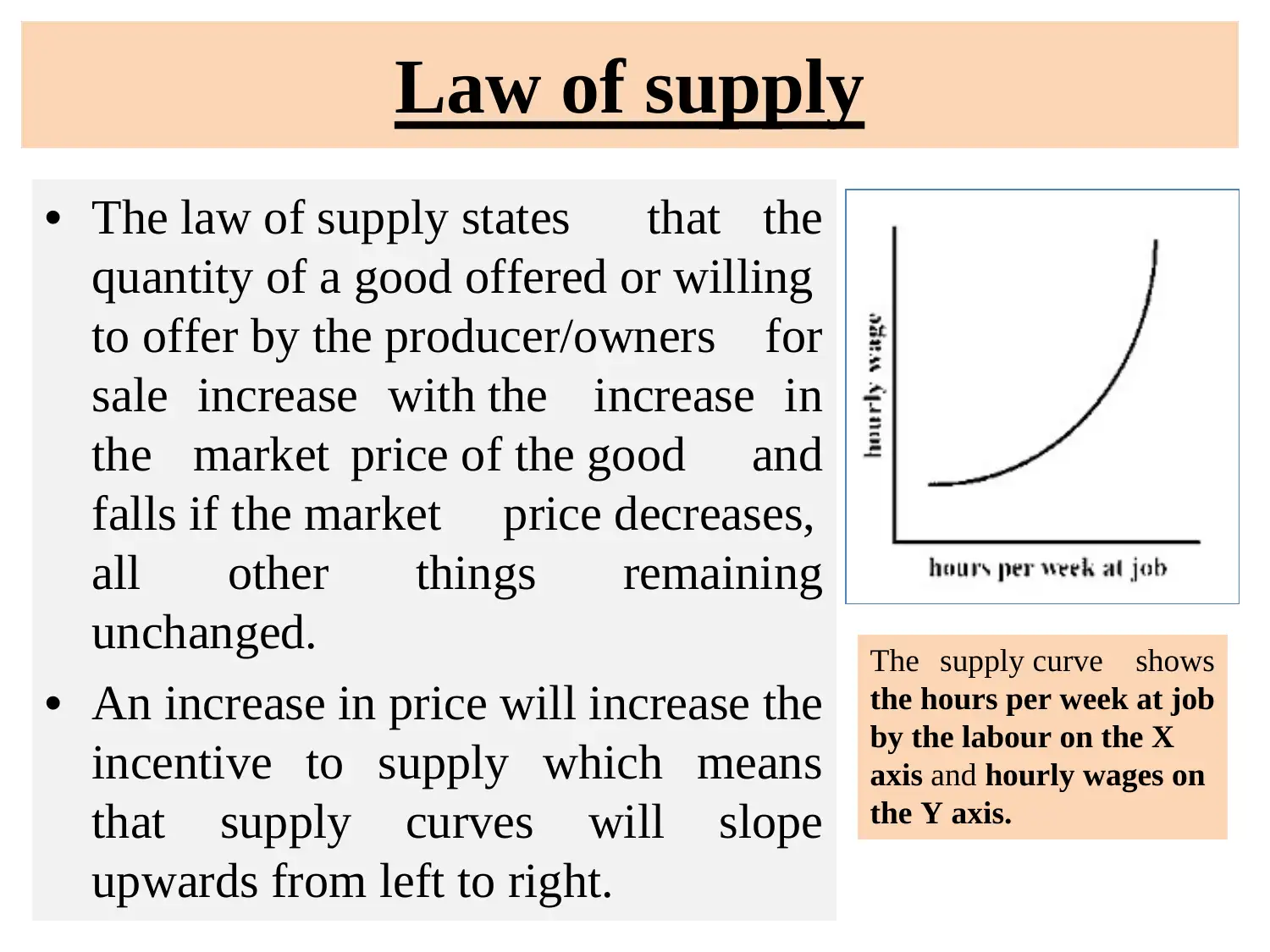
Law of supply
• The law of supply states that the
quantity of a good offered or willing
to offer by the producer/owners for
sale increase with the increase in
the market price of the good and
falls if the market price decreases,
all other things remaining
unchanged.
• An increase in price will increase the
incentive to supply which means
that supply curves will slope
upwards from left to right.
The supply curve shows
the hours per week at job
by the labour on the X
axis and hourly wages on
the Y axis.
• The law of supply states that the
quantity of a good offered or willing
to offer by the producer/owners for
sale increase with the increase in
the market price of the good and
falls if the market price decreases,
all other things remaining
unchanged.
• An increase in price will increase the
incentive to supply which means
that supply curves will slope
upwards from left to right.
The supply curve shows
the hours per week at job
by the labour on the X
axis and hourly wages on
the Y axis.
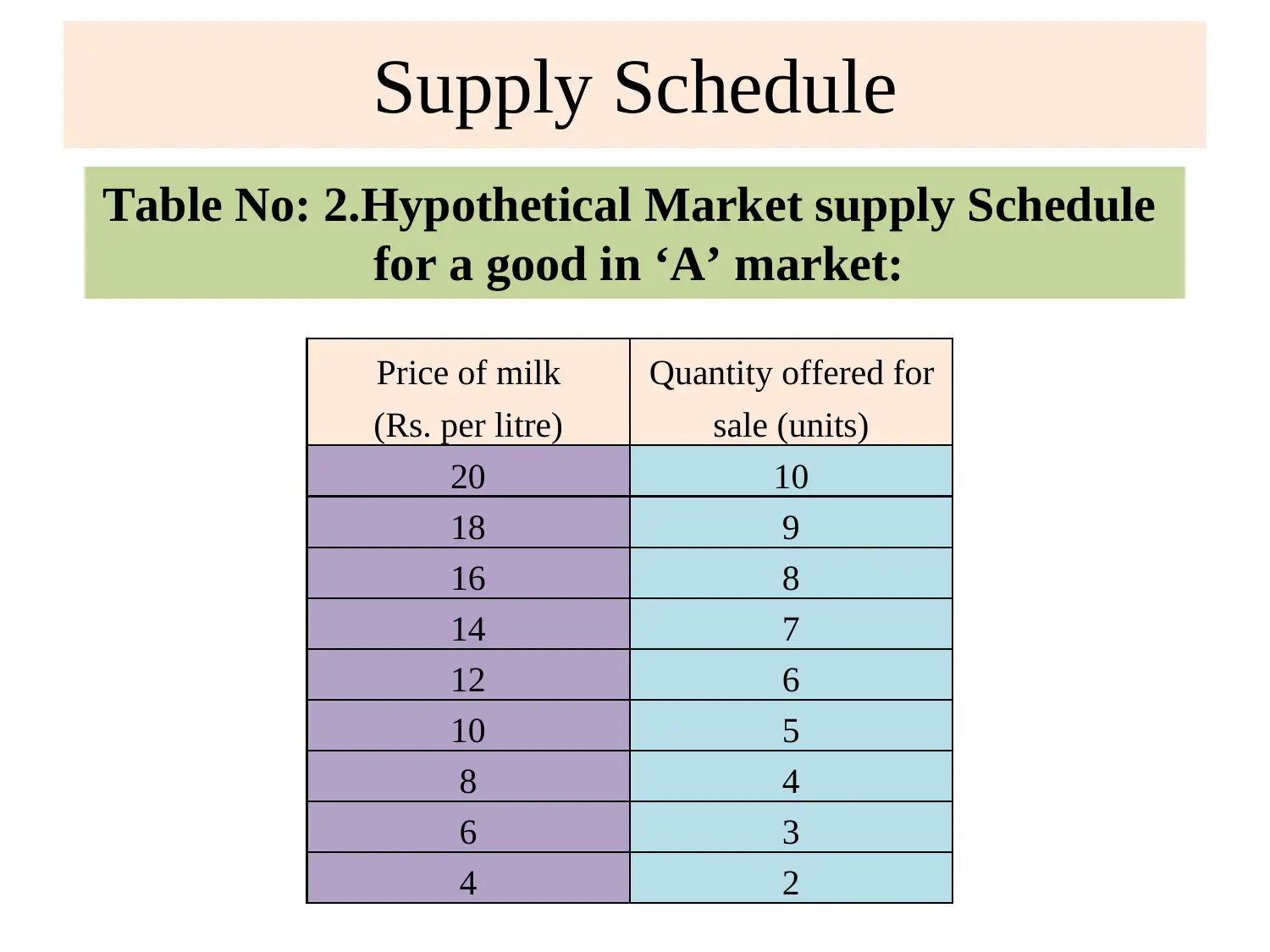
Supply Schedule
Price of milk
(Rs. per litre)
Quantity offered for
sale (units)
20 10
18 9
16 8
14 7
12 6
10 5
8 4
6 3
4 2
Table No: 2.Hypothetical Market supply Schedule
for a good in ‘A’ market:
Price of milk
(Rs. per litre)
Quantity offered for
sale (units)
20 10
18 9
16 8
14 7
12 6
10 5
8 4
6 3
4 2
Table No: 2.Hypothetical Market supply Schedule
for a good in ‘A’ market:
Secure Best Marks with AI Grader
Need help grading? Try our AI Grader for instant feedback on your assignments.
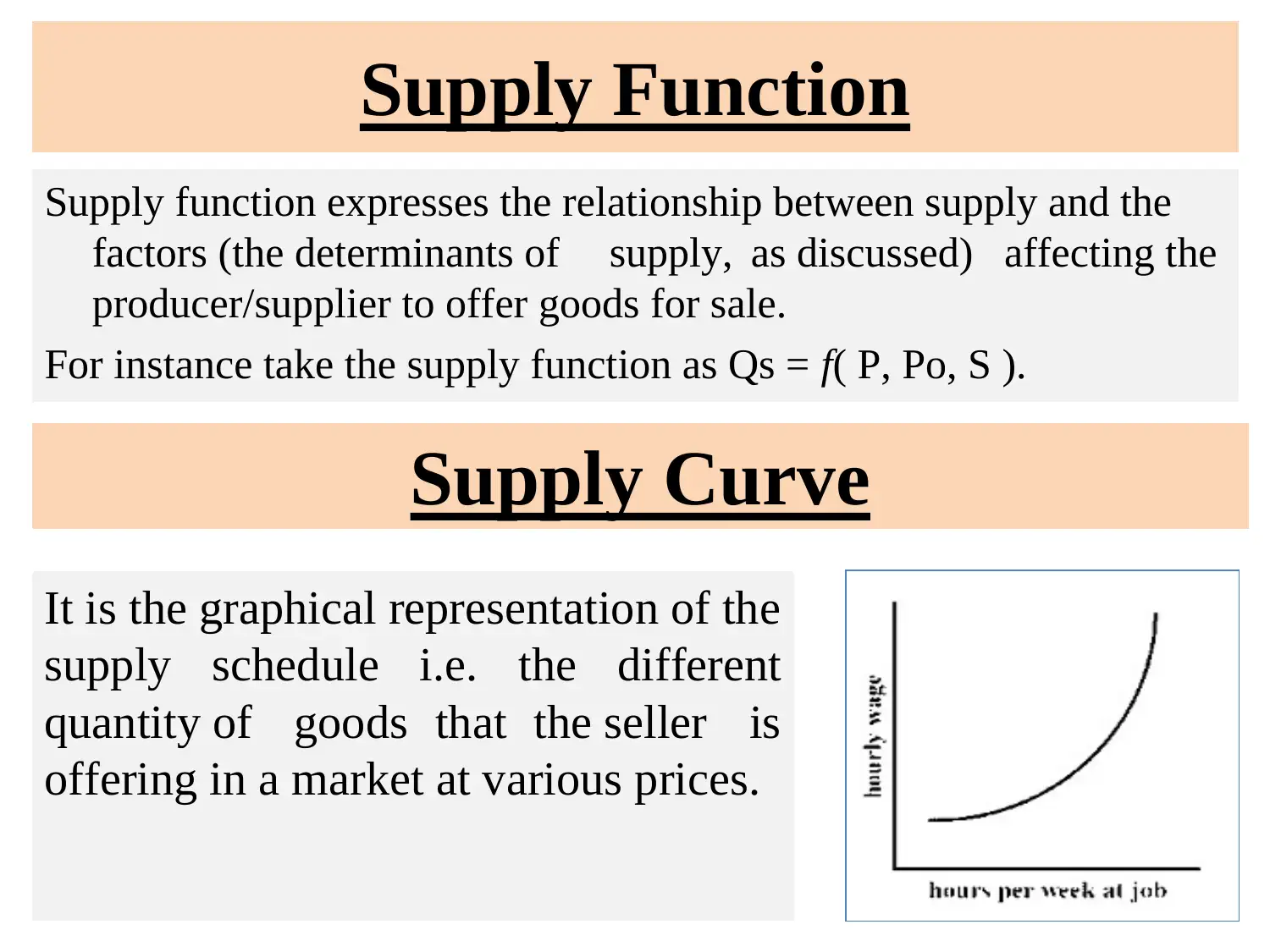
Supply Function
Supply function expresses the relationship between supply and the
factors (the determinants of supply, as discussed) affecting the
producer/supplier to offer goods for sale.
For instance take the supply function as Qs = f( P, Po, S ).
Supply Curve
It is the graphical representation of the
supply schedule i.e. the different
quantity of goods that the seller is
offering in a market at various prices.
Supply function expresses the relationship between supply and the
factors (the determinants of supply, as discussed) affecting the
producer/supplier to offer goods for sale.
For instance take the supply function as Qs = f( P, Po, S ).
Supply Curve
It is the graphical representation of the
supply schedule i.e. the different
quantity of goods that the seller is
offering in a market at various prices.
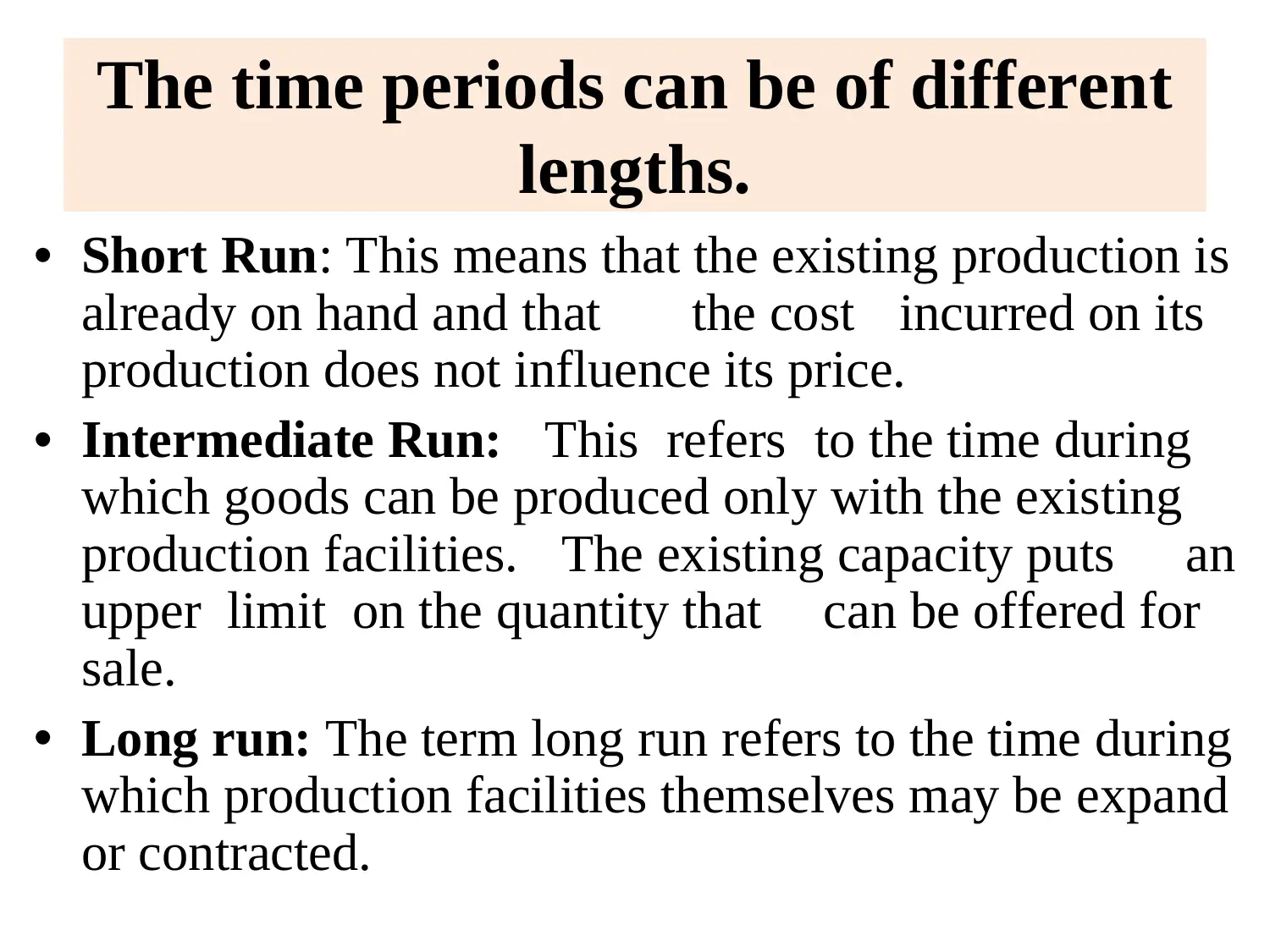
The time periods can be of different
lengths.
• Short Run: This means that the existing production is
already on hand and that the cost incurred on its
production does not influence its price.
• Intermediate Run: This refers to the time during
which goods can be produced only with the existing
production facilities. The existing capacity puts an
upper limit on the quantity that can be offered for
sale.
• Long run: The term long run refers to the time during
which production facilities themselves may be expand
or contracted.
lengths.
• Short Run: This means that the existing production is
already on hand and that the cost incurred on its
production does not influence its price.
• Intermediate Run: This refers to the time during
which goods can be produced only with the existing
production facilities. The existing capacity puts an
upper limit on the quantity that can be offered for
sale.
• Long run: The term long run refers to the time during
which production facilities themselves may be expand
or contracted.
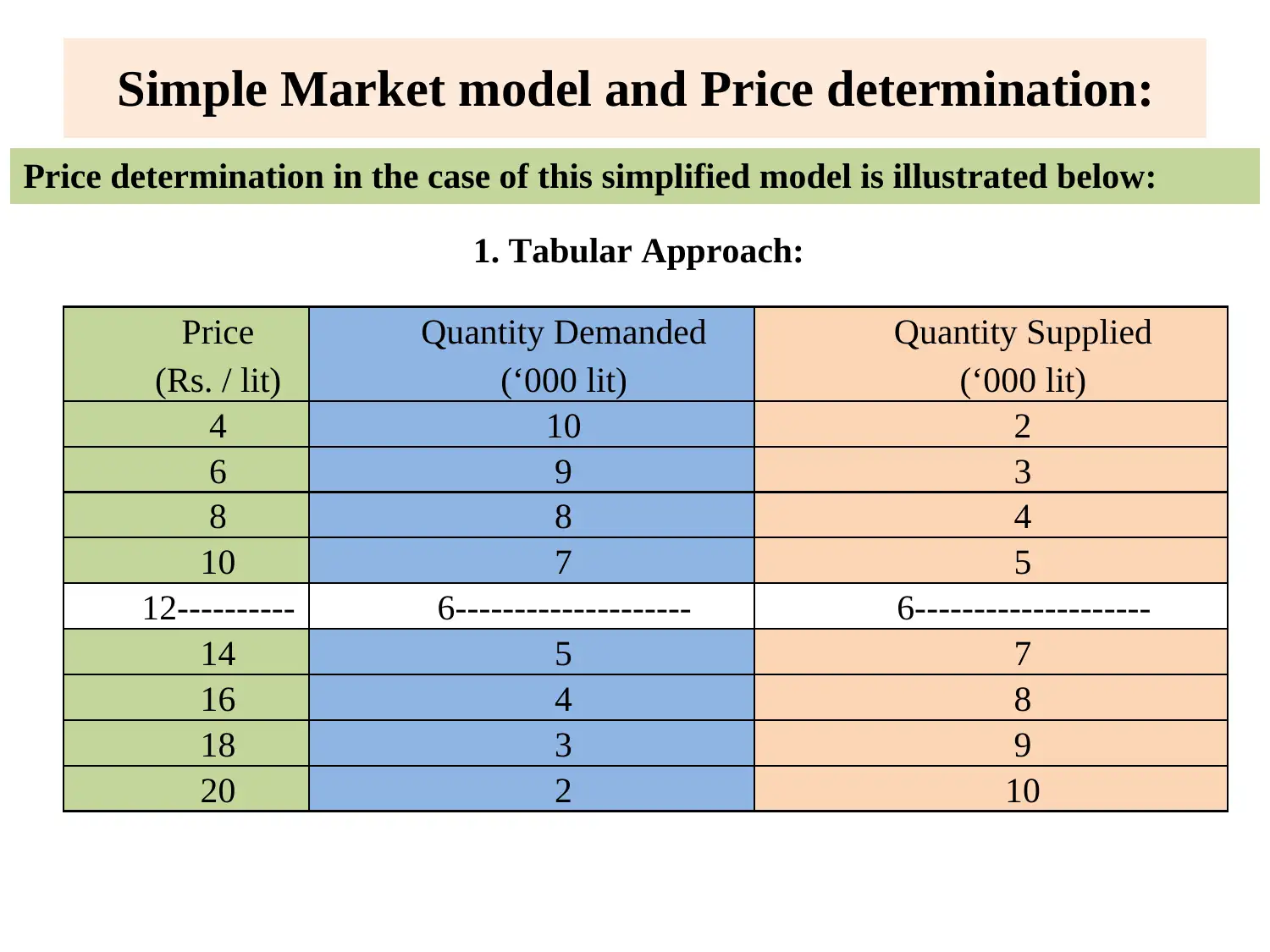
Simple Market model and Price determination:
1. Tabular Approach:
Price determination in the case of this simplified model is illustrated below:
Price
(Rs. / lit)
Quantity Demanded
(‘000 lit)
Quantity Supplied
(‘000 lit)
4 10 2
6 9 3
8 8 4
10 7 5
12---------- 6-------------------- 6--------------------
14 5 7
16 4 8
18 3 9
20 2 10
1. Tabular Approach:
Price determination in the case of this simplified model is illustrated below:
Price
(Rs. / lit)
Quantity Demanded
(‘000 lit)
Quantity Supplied
(‘000 lit)
4 10 2
6 9 3
8 8 4
10 7 5
12---------- 6-------------------- 6--------------------
14 5 7
16 4 8
18 3 9
20 2 10
Paraphrase This Document
Need a fresh take? Get an instant paraphrase of this document with our AI Paraphraser
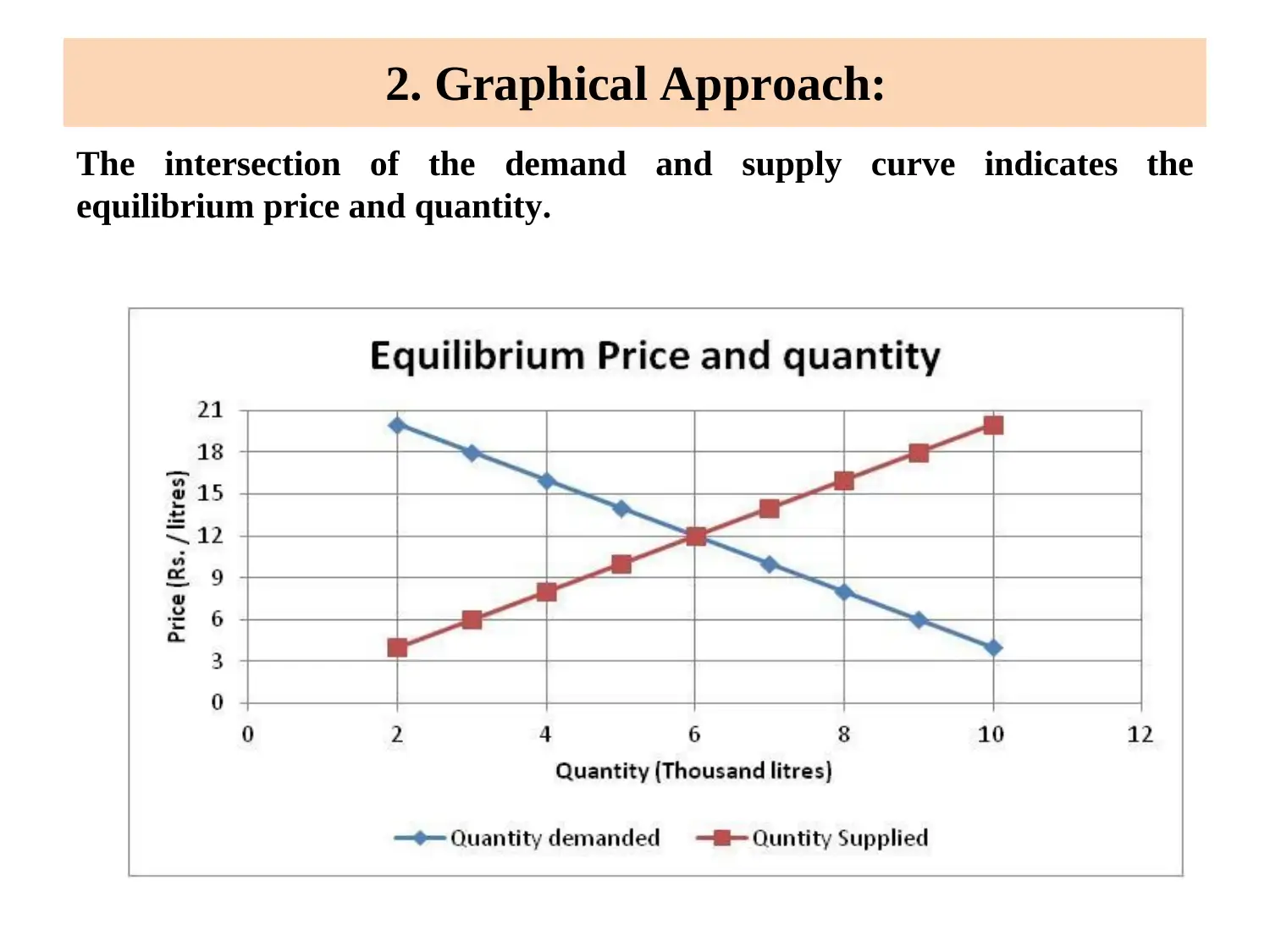
2. Graphical Approach:
The intersection of the demand and supply curve indicates the
equilibrium price and quantity.
The intersection of the demand and supply curve indicates the
equilibrium price and quantity.
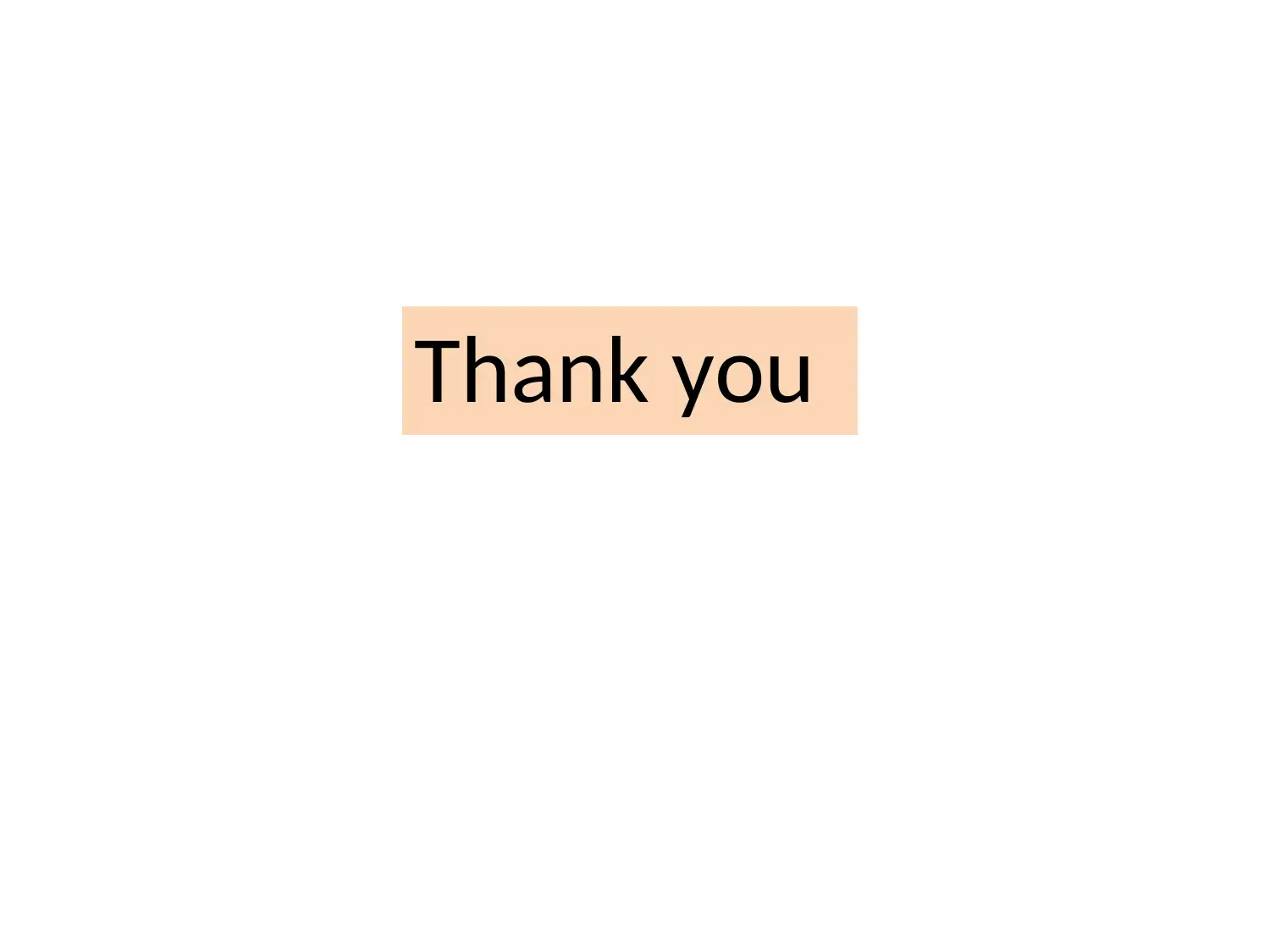
Thank you
1 out of 21
Related Documents
Your All-in-One AI-Powered Toolkit for Academic Success.
+13062052269
info@desklib.com
Available 24*7 on WhatsApp / Email
![[object Object]](/_next/static/media/star-bottom.7253800d.svg)
Unlock your academic potential
© 2024 | Zucol Services PVT LTD | All rights reserved.





